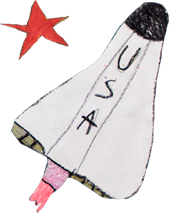Pursuing promising research leads at Duke
According to Darell D. Bigner, M.D., Ph.D., Cancer Research Professor at The Preston Robert Tisch Brain Tumor Center at Duke University, one of the primary problems in developing new treatments for childhood brain tumors is the lack of permanent cultured childhood brain tumor cell lines and permanent solid tumors from childhood brain tumors that can be grown in specialized mice, which lack an effective immune system.
With continued support from The Rory David Deutsch Foundation, Dr. Bigner and his colleagues at Duke have over the last several years developed eight new permanent cell lines from astrocytic brain tumors, the tumors with the cell type that is most common in brain stem gliomas. They have also developed several new astrocytic xenografts, which can be grown either in the subcutaneous space or in the brain of these special immunocompromised mice. “With these cell lines and xenografts, many new treatments for childhood brain tumors are being evaluated,” says Dr. Bigner. “These include the newest generation of small molecule drugs, called small molecule inhibitors, which primarily stop tumor cell growth and kill cells without damaging the bone marrow or other organs or tissues in the body, such as is often the case with the older type of cytotoxic drugs.”
The Foundation’s partnership with Duke has been instrumental in a completely new approach to treating childhood brain tumors as well. “Monoclonal antibodies are proteins which are developed from bone marrow and spleen cells that produce proteins that react with molecules on tumor cell surfaces that are not present on normal brain,” Dr. Bigner explains. “These monoclonal antibodies, which start out as a large protein, can be separated into smaller protein fragments that penetrate tumors much better than the larger parent proteins from which they are derived.” In collaboration with National Cancer Institute scientists, the Duke investigators have prepared genetic combinations of these monoclonal antibody fragments and a very potent bacterial toxin which is capable of killing brain tumor cells after one molecule of the toxin antibody construct is internalized into the tumor cells. These so-called immunotoxins have shown great tumor killing ability against childhood brain tumors grown as xenografts in the immunocompromised mice described above. Other investigators have shown that these types of immunotoxin constructs can be injected into brain tumors in the brain stem as well as into any site in the brain. These new approaches will shortly undergo manufacturing so that applications can be made in the future to the Food and Drug Administration for clinical trials in children with brain tumors.
Another novel approach to childhood brain tumors comes from the laboratory of Dr. John Sampson, one of the key investigators in the Preston Robert Tisch Brain Tumor Center at Duke. Dr. Sampson has developed several types of so-called tumor vaccines. Tumor vaccines differ from the more familiar preventive vaccines to guard against viral infections like Polio. Tumor vaccines are actually treatment vaccines that are given after the diagnosis of a tumor. Dr. Sampson and his colleagues have found that a common virus called Cytomegalovirus, which infects more than ninety percent of all humans, is particularly expressed in brain tumors, including childhood brain tumors. He and his colleagues have developed ways of sensitizing the patients’ immune cells so that they will recognize and kill tumor cells that are infected by this virus. “This promising approach is also proceeding to get approval for the Food and Drug Administration to begin these types of tumor vaccine trials in children with brain tumors,” says Dr Bigner. “None of this work would have been possible without the support of The Rory David Deutsch Foundation.”






















